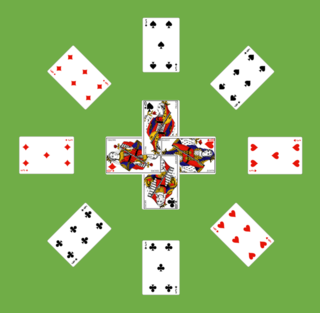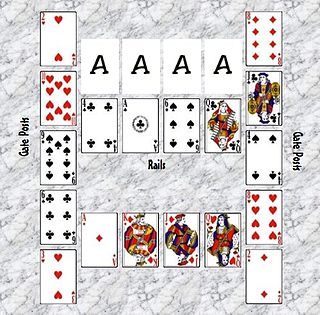Related Research Articles

Games of patience, or (card) solitaires as they are usually called in North America, have their own 'language' of specialised terms such as "building down", "packing", "foundations", "talon" and "tableau". Once learnt they are helpful in describing, succinctly and accurately, how the games are played. Patience games are usually for a single player, although a small number have been designed for two and, in rare cases, three or even four players. They are games of skill or chance or a combination of the two. There are three classes of patience grouped by object.

Napoleon at St Helena is a 2-deck patience or solitaire card game for one player. It is quite difficult to win, and luck-of-the-draw is a significant factor. The Emperor Napoleon often played patience during his final exile to the island of St Helena, and this is said to be the version he probably played. Along with its variants, it is one of the most popular two-deck patiences or solitaires. The winning chances have been estimated as 1 in 10 games, with success typically dependent on the player's ability to clear one or more columns. The game is the progenitor of a large family of similar games, mostly with variations designed to make it easier to get out.
Musical is a patience or card solitaire using a single deck of 52 playing cards. It is similar to another old game called Calculation except there is no tableau to play in and there is only one wastepile rather than four.

Quadrille is the name of two loosely related card games of the Patience or solitaire type which are often confused. Both use a pack of 52 playing cards. The earlier one was also known as La Française or Royal Quadrille, the slightly later one as Captive Queens. The name is derived from the desired outcome of the earlier game in which the four Kings and Queens are arranged in a square formation as in the European dance of quadrille that was fashionable in the 18th and 19th centuries.
British Square is a patience or solitaire card game which uses two decks of 52 playing cards each. It is a fan-type game in the style of La Belle Lucie. It has an unusual feature of switchback building whereby each foundation is first built up and then built down.
Congress is a patience or solitaire card game using two decks of 52 playing cards each. It is a simple but strategic game which requires skill and careful choosing for it to be completed successfully. It is closely related to Forty Thieves but has eight instead of ten columns. It is sometimes called President's Cabinet, and can typically be completed successfully less than once in 20 games.

Crazy Quilt is a patience or solitaire card game using two decks of 52 playing cards each. The game is so-called because the reserve resembles the weaves of a carpet or an arrangement of a quilt, with cards alternating vertical and horizontal rotations.
Eagle Wing is a Patience game which is played with a deck of 52 playing cards. The game takes its name from the tableau which depicts an eagle-like bird spreading its wings in flight. It is somewhat related to the Canfield variant Storehouse.
Queen of Italy is a patience or card solitaire game played with two packs of playing cards. It is a very strategic game that rewards careful planning, since the cards that potentially block the game are presented at the start, and with care it can be completed about half the number of attempts.
Duchess or Glenwood is a patience or solitaire card game which uses a deck of 52 playing cards. It has all four typical features of a traditional patience or solitaire game: a tableau, a reserve, a stock or talon and a wastepile. It is relatively easy to get out. It is a reserved packer, the same type of game as Canfield or Demon. Arnold describes it as "an interesting game with a fair chance of a favourable outcome."

Colorado is a solitaire card game which is played using two decks of playing cards. It is a game of card building which belongs to the same family as games like Sir Tommy, Strategy, and Calculation. It is considered an easy game with 80% odds of being completed successfully.
Westcliff is the name of two closely-related patience or card solitaire games of the simple packer type, both of which are played using a deck of 52 playing cards. One version is particularly easy to win, with odds of 9 in 10; the other is harder with odds closer to 1 in 4. The game has a variant, Easthaven.
Emperor is an English patience or solitaire card game which is played using two packs of playing cards. Although similar to other members of the large Napoleon at St Helena family, Emperor introduced the unique and distinguishing feature of worrying back as well as the novel term "sealed packet".
Napoleon's Square is a patience or solitaire card game which uses two decks of playing cards. First described in a revised edition of Lady Cadogan's Illustrated Games of Patience or Solitaire in the early 1900s, it is an easy variation of Napoleon at St Helena. It is not determined if Napoleon actually played this game, or any solitaire game named after him.
Deuces or Twos is a patience or card solitaire game of English origin which is played with two packs of playing cards. It is so called because each foundation starts with a Deuce, or Two. It belongs to a family of card games that includes Busy Aces, which is derived in turn from Napoleon at St Helena.

Four Seasons is a patience or card solitaire which is played with a single deck of playing cards. It is also known as Corner Card and Vanishing Cross, due to the arrangement of the foundations and the tableau respectively. Another alternate name is Cross Currents.
British Constitution is an English patience or card solitaire played with two packs of playing cards. It is a card game with a high chance in winning.

Fortune's Favor or Fortune's Favour is a patience or card solitaire which is played with a deck of 52 playing cards. It is so-called probably because the chances of winning are completely on the player's side. It is a significantly simplified version of the game Busy Aces, a member of the Forty Thieves family of solitaire games.

Gate is a patience or card solitaire game played using a pack of 52 playing cards, and is a member of the Canfield family. It gets its name because the cards are laid out in such a way that they form a gate. Average players can expect to win 99% of their games.
Following is a patience or card solitaire that uses a single pack of playing cards. It is so called because a player has to follow a rotation of suits. It was first described in 1892 in Games of Patience by Mary Whitmore Jones and has since appeared in other books and software.
